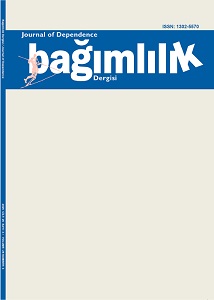ALKOL VE MADDE KULLANIM BOZUKLUĞU OLAN YATAN HASTALARDA EK TANI, KULLANILAN MADDE VE KİŞİLİK BOZUKLUKLARININ YATIŞ SÜRELERİNE ETKİSİ
Anahtar Kelimeler:
madde bağımlılığı- yatış süresi- ek tanı- kişilik bozukluklarıÖzet
Amaç: Bu çalışmanın amacı, hastanede kalış süresi ile kullanılan madde tipleri, kişilik bozuklukları ve ek tanılar arasında ilişki olup olmadığını araştırmaktır.
Yöntem: DSM-5 kriterlerine göre alkol-madde kullanım bozukluğu tanısı alan toplam 131 hasta çalışmaya dahil edildi. Katılımcılara Sosyodemografik veri formu verilmiş ve ek psikiyatrik bozuklukların tanısı konulmuştur. Hastaların tedaviyi tamamladıkları gün sayısı ve kullandıkları madde türleri not edilmiştir.
Bulgular: Hastanede kalış süresi ile yaş ve kullanılan maddeler arasında istatistiksel olarak anlamlı bir ilişki bulunmuştur. Bu farklılık özellikle alkol grubu ve opioid grubu arasında bulunmuştur.
Tartışma: Kullanılan madde tipi ile hastanede kalış süresi arasındaki ilişki, maddelerin yoksunluk belirtileri ve madde bağımlılığı olan bireylerin sosyodemografik durumlarıyla ile ilişkili olabilir. Yaş ve hastanede kalış süresi arasında pozitif bir ilişki olması yaşla birlikte tedavi uyumunun artması olarak yorumlanabilir.
Kaynaklar
World Health Organization. The World Health Report 2001: Mental Health : New Understanding, New Hope. World Health Organization; 2001.
Supply of and demand for physiatrists: review and update of the 1995 physical medicine and rehabilitation workforce study. A special report. The Lewin Group. Am J Phys Med Rehabil. 1999;78: 477–485.
Ravndal E, Vaglum P, Skjei EH. Use of treatment among drug abusers. A five-year prospective study of a treatment-seeking cohort. Nordic Studies on Alcohol and Drugs. 2001;18: 153–162.
US Department of Health & Human Services Substance Abuse & Mental Health Services Administration; Office of Applied Studies. Results From the 2001 National Household Survey on Drug Abuse: Volume I. Summary of National Findings (Internet). PsycEXTRA Dataset. 2002. doi:10.1037/e380242004-001
Siqueland L, Crits-Christoph P, Gallop B et al. Who starts treatment: engagement in the NIDA collaborative cocaine treatment study. Am J Addict. 2002;11: 10–23.
Shwartz M, Mulvey KP, Woods D et al. Length of stay as an outcome in an era of managed care. An empirical study. J Subst Abuse Treat. 1997;14: 11–18.
Lang MA, Belenko S. Predicting retention in a residential drug treatment alternative to prison program. J Subst Abuse Treat. 2000;19: 145–160.
Brewer LG, Zawadski ML, Lincoln R. Characteristics of alcoholics and codependents who did and did not complete treatment. Int J Addict. 1990;25: 653–663.
Arfken CL, Klein C, di Menza S, Schuster CR. Gender differences in problem severity at assessment and treatment retention. J Subst Abuse Treat. 2001;20: 53–57.
Gainey RR, Wells EA, Hawkins JD, Catalano RF. Predicting treatment retention among cocaine users. Int J Addict. 1993;28: 487–505.
Maglione M, Chao B, Anglin D. Residential Treatment of Methamphetamine Users: Correlates of Drop-Out from the California Alcohol and Drug Data System (Cadds), 1994–1997. Addict Res Theory. 2000;8: 65–79.
Ravndal E, Vaglum P. Psychopathology and substance abuse as predictors of program completion in a therapeutic community for drug abusers: a prospective study. Acta Psychiatr Scand. 1991;83: 217– 222.
Dobkin PL, De Civita M, Paraherakis A, Gill K. The role of functional social support in treatment retention and outcomes among outpatient adult substance abusers. Addiction. 2002;97: 347–356.
Brown RA, Lejuez CW, Kahler CW, Strong DR. Distress tolerance and duration of past smoking cessation attempts. J Abnorm Psychol. 2002;111: 180–185.
Messina N, Wish E, Nemes S. Predictors of treatment outcomes in men and women admitted to a therapeutic community. Am J Drug Alcohol Abuse. 2000;26: 207–227.
Armenian SH, Chutuape MA, Stitzer ML. Predictors of discharges against medical advice from a short-term hospital detoxification unit. Drug Alcohol Depend. 1999;56: 1–8.
Tyrer P, Mulder R, Crawford M et al. Personality disorder: a new global perspective. World Psychiatry. 2010;9: 56–60.
Evren C, Kural S, Erkiran M. Antisocial personality disorder in Turkish substance dependent patients and its relationship with anxiety, depression and a history of childhood abuse. Isr J Psychiatry Relat Sci. 2006;43: 40–46.
Casadio P, Olivoni D, Ferrari B et al. Personality disorders in addiction outpatients: prevalence and effects on psychosocial functioning. Subst Abuse. 2014;8: 17–24.
Fals-Stewart W. Personality characteristics of substance abusers: an MCMI cluster typology of recreational drug users treated in a therapeutic community and its relationship to length of stay and outcome. J Pers Assess. 1992;59: 515–527.
Sheppard D, Smith GT, Rosenbaum G. Use of MMPI subtypes in predicting completion of residential alcoholism treatment program. J Consult Clin Psychol. 1988;56: 590–596.
Hattenschwiler J, Ruesch P, Modestin J. Comparison of four groups of substance-abusing in-patients with different psychiatric comorbidity. Acta Psychiatr Scand. 2001;104: 59–65.
Hubbard RL, Craddock SG, Anderson J. Overview of 5-year followup outcomes in the drug abuse treatment outcome studies (DATOS). J Subst Abuse Treat. 2003;25: 125–134.
Kleinman PH, Kang SY, Lipton DS, Woody GE, Kemp J, Millman RB. Retention of cocaine abusers in outpatient psychotherapy. Am J Drug Alcohol Abuse. 1992;18: 29–43.
First MB, Spitzer RL, Gibbon M, Williams JBW. Structured Clinical Interview for DSM-III-R Personality Disorders [Internet]. PsycTESTS Dataset. 1995.
Coşkunol H, Bağdiken İ, Sorias S, Saygılı R. SCID-II (Türkçe versiyonu) görüşmesinin kişilik bozukluklarındaki güvenilirliği. Türk Psikoloji Dergisi 1994; 9 (32): 26-29.
İndir
Yayınlanmış
Nasıl Atıf Yapılır
Sayı
Bölüm
Lisans
Telif Hakkı (c) 2025 Bağımlılık Dergisi

Bu çalışma Creative Commons Attribution-NonCommercial-NoDerivatives 4.0 International License ile lisanslanmıştır.
...
